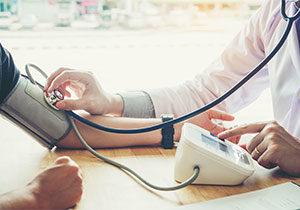
High blood pressure, also called hypertension, is a risk factor for heart and kidney diseases and stroke. Heart disease is the number one killer in the United States and stroke is the third most common cause of death. Nearly one in every four American adults has high blood pressure, but 31% are unaware of it.
High blood pressure is especially dangerous because it often gives no warning signs or symptoms. Fortunately, you can find out if you have high blood pressure by having your blood pressure checked regularly. If it is high, you can take steps to lower it. If your blood pressure is normal, you can take steps to keep it from becoming high.
Each time the heart beats (about 60-70 times a minute at rest) it pumps out blood into the arteries. Blood pressure is the force of the blood pushing against the walls of your arteries. Your blood pressure is at its greatest when the heart contracts and is pumping the blood. This is called the systolic pressure (the top number). When the heart is at rest, in between beats, your blood pressure falls. This is the diastolic pressure (the bottom number).
Causes of High Blood Pressure
In the early and middle adult years, men have high blood pressure more often than women. But as men and women age, the reverse is true. More women, after menopause, have high blood pressure. More than half of all Americans over age 65 have high blood pressure. Heredity can make some individuals more likely than others to get high blood pressure.
In 95% of cases, there is no single known cause of high blood pressure. This is called “primary” or “essential” hypertension. This type of blood pressure can’t be cured, although in most cases it can be controlled. Less often, high blood pressure can be traced to a known cause like tumors of the adrenal gland, chronic kidney disease, hormone abnormalities, use of birth control pills, or pregnancy. This is called “secondary hypertension.” It is usually cured if the cause can be identified and corrected.
How Can You Prevent/Treat High Blood Pressure?
High blood pressure can’t be cured, although in most cases it can be controlled.
- Maintain a healthy weight (lose weight if you are overweight)
- Exercise daily
- Watch portions/serving size
- Choose foods low in calories and fat
- Choose foods lower in salt and sodium:
- Limit alcoholic beverages (1 to 2 drinks per day)
- Limit caffeine to 200 mg per day (2 12oz cups of coffee)
- Do not smoke
- Reduce stress levels
For assistance managing blood pressure, contact your primary care physician.